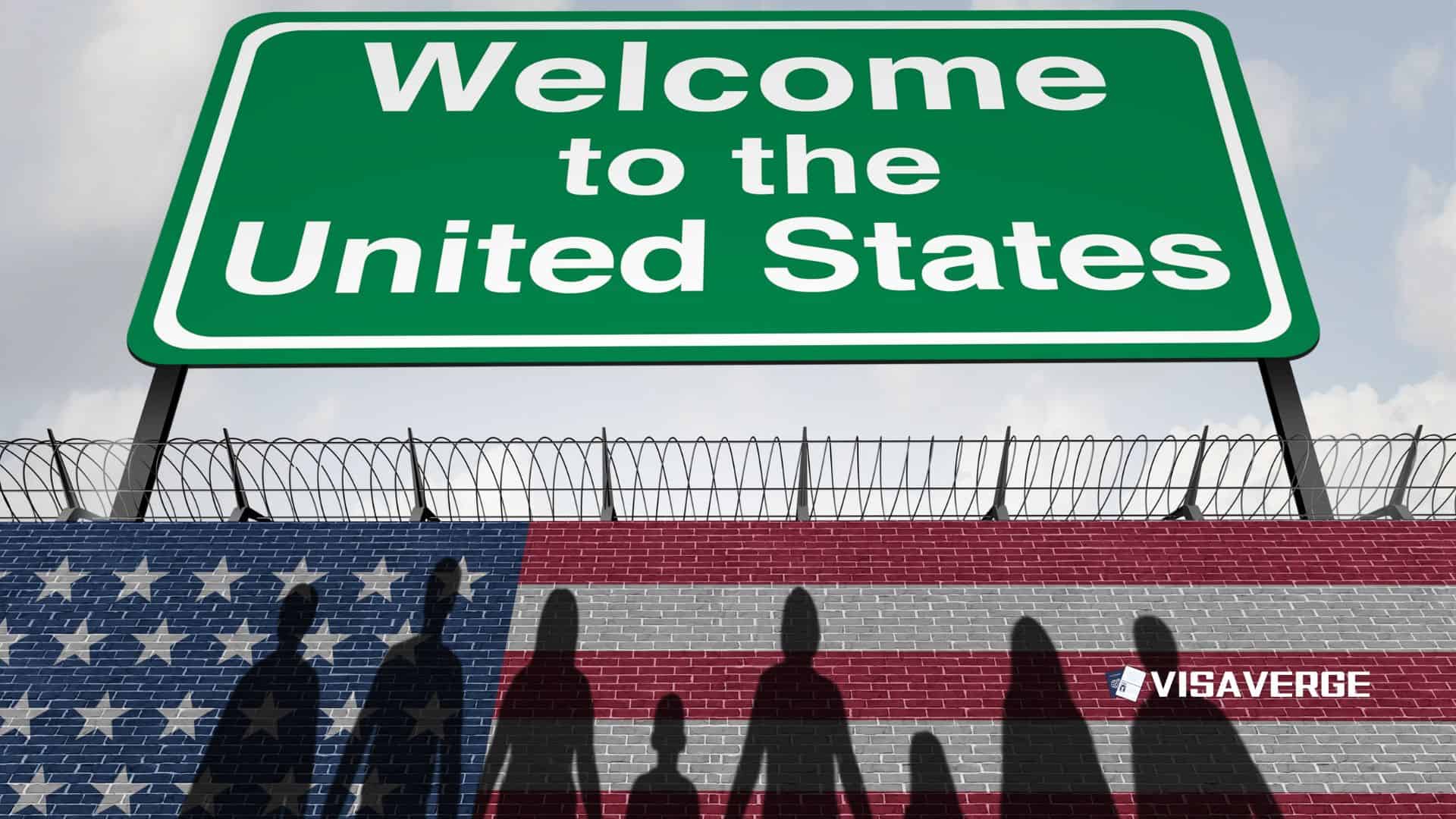(UNITED STATES) The Trump administration is promoting a message of progress on the immigration backlog, but government data and court records show a very different reality in 2025: case piles at both U.S. Citizenship and Immigration Services (USCIS) and the immigration courts have reached record highs, while new policies face a steady stream of legal challenges over due process.
As of September 2025, USCIS reported a historic 11.3 million pending cases and an unusual “frontlog” of more than 34,000 unopened filings. Immigration courts now hold more than 3.6 million pending cases, with fewer judges and tighter limits on hearings. Civil rights groups, legal aid providers, and several courts say the combined picture is a system stretched thin and tilted against people seeking protection, work permission, or family unity.

Administration’s Narrative vs. the Numbers
The administration argues that tougher rules, faster case closures, and lower border crossings show success. Officials say they are “streamlining” procedures to move cases faster and protect national security, often framing the shifts as a response to an “invasion.”
But the sharp rise in the immigration backlog and the spike in the USCIS backlog in early 2025 suggest that case completion has slowed. In Q2 of FY2025 (January to March), USCIS completed 2.7 million cases—an 18% drop from the same period a year earlier and 12% fewer than the prior quarter. The agency reported that the pending total rose by roughly 1.6 million cases during that quarter alone.
Processing slowed for key forms such as I-129 (many nonimmigrant workers), I-90 (green card replacement), and I-765 (work authorization), with some categories seeing wait times jump by hundreds of percent year-over-year.
USCIS “Frontlog” and the Downstream Effects
The most visible pressure point is the rapid growth of cases sitting in line at USCIS, where family, employment, humanitarian, and naturalization applications compete for attention.
- The agency’s “frontlog” refers to unopened mail that has not been entered into the system. A frontlog of over 34,000 files is a warning flare: when new packages wait just to be logged, every downstream step slows—receipts, biometrics, evidence notices, and final decisions.
- Processing times on the USCIS Check Case Processing Times page have shown wide swings and longer ranges for the same form and category month to month in 2025.
Consequences of these delays include:
- Families waiting on I-130 approvals face added months before consular steps can begin.
- Workers using I-129 for H-1B, L-1, or O-1 categories risk losing start dates or job offers if approvals lag; premium processing helps some but not all.
- Individuals needing I-765 work permits are sidelined from jobs; employers cannot fill roles easily.
- Lawful permanent residents who lost or damaged their green cards depend on timely I-90 decisions to confirm identity and work status.
Delays multiply when applicants do not receive receipts in time or when biometrics appointments slip. A late work permit can lead to job loss, rent trouble, or insurance lapses. A stalled travel document can split families during emergencies. As one legal aid attorney described, “Every week-long delay in a work permit can mean a week without pay for a parent.”
Immigration Courts: Fewer Judges, More Paper-Based Dismissals
In the immigration courts, the backlog has crossed 3.6 million active cases. Judges and former officials say the system cannot sustain this trend without major staffing and policy adjustments.
Key shifts include:
- The administration has reduced the number of immigration judges and Board of Immigration Appeals members, which directly limits throughput.
- New directives allow immigration judges to dismiss certain asylum claims on the papers—without a live hearing—if they deem applications “legally deficient.”
Purpose and concerns:
- The change aims to speed outcomes, but it raises deep due process concerns for asylum seekers who often do not have lawyers and must explain complex harm in unfamiliar legal terms.
- A paper review can miss facts that surface only in live testimony—especially for people who do not speak English, cannot gather evidence from abroad, or are traumatized.
Critics warn this shortcut risks wrongful removals and breaks with due process—the basic constitutional guarantee of a fair chance to be heard before the government takes away liberty or property.
Special Vulnerabilities: Children and Legal Services Cuts
Advocates point to the fallout from the termination of federally funded legal services for about 26,000 unaccompanied migrant children. Although a court ordered funding restored, service cuts left many children to face complex proceedings alone.
- Children rarely understand deadlines, legal standards, or the need to update addresses and file evidence.
- When kids miss hearings, they can be ordered removed in absentia—without ever telling their story.
Policy Shifts, Legal Challenges, and Human Stakes
The 2025 policy landscape favors faster removals and tighter screening. The administration has invoked emergency and wartime authorities to speed deportations, sometimes resisting or appealing court orders and citing state-secrets claims to avoid disclosing operational details.
- These moves aim to deter irregular crossings but have prompted lawsuits from civil rights groups and immigrant organizations.
- Several lower courts—and at times the Supreme Court—have stepped in to clarify due process requirements; at least 50 multi-plaintiff cases were active that year.
Human impacts are often quiet but profound:
- Missed birthdays, stalled job offers, and uncertainty about school calendars or funeral travel.
- A father in removal proceedings may wait years while his U.S.-citizen children grow up without knowing whether he will be deported.
- A nurse with an approved job offer may not start work because I-129 adjudication drags on.
- A teenager fleeing gang violence could see an asylum claim dismissed on paper, even though a hearing might reveal key facts.
USCIS cuts to grants for naturalization, language access, and civics programs have compounded barriers. Community groups report that the end of large-scale naturalization ceremonies removes a crucial point of access where officials and nonprofits help new citizens update Social Security records, register to vote, and understand rights and duties.
The Debate: Streamlining vs. Due Process
The administration’s defense:
- Focus on enforcement metrics and “streamlining.”
- Argues that reduced border crossings, faster case closures, and expanded removal tools show success.
- Supporters say many asylum filings lack legal basis and that paper review efficiently filters weak cases.
Opponents’ counterarguments:
- The immigration backlog has grown to historic levels; the USCIS backlog surged within months.
- Rushed procedures erode due process, which is not a luxury but a legal floor—especially when stakes include exile, detention, or family separation.
- Courts have long held that people facing removal are entitled to a fair chance to present their case; what counts as a fair hearing is central to ongoing litigation.
VisaVerge.com analysis highlights the tension between headline claims of faster outcomes and applicants’ lived experiences of difficulty reaching live adjudicators or scheduling meaningful hearings.
Why 2025 Feels Like a Reversal
Under President Biden, USCIS recorded a 15% backlog reduction in FY2023, with record case completions and faster processing in several categories. That improvement came from staffing increases, overtime, technology upgrades, fee adjustments, and a focus on work authorization backlogs.
The reversal in early 2025 reflects two forces:
- Increased demand in many lines—family petitions, employment categories, humanitarian benefits—as applicants rushed to file amid policy shifts.
- New policies redirected limited staff toward enforcement and security screening over adjudication.
The result: an 18% year-over-year drop in completions in Q2 2025 and a dramatic climb in pending cases to 11.3 million.
Practical impacts for institutions:
- Employers delay start dates, move roles overseas, or use contract staff while waiting for I-129 approvals.
- Universities face ripple effects when international students depend on timely I-765 approvals for Optional Practical Training.
- Families juggle extensions, temporary evidence of status, DMV renewals, and travel plans amid uncertainty.
The Two-Track System and the Legal Fight
Advocates describe a “two-track” system: quick closures for some and years-long waits for others.
More than 50 active challenges target rules on:
- Credible fear screenings
- Asylum eligibility
- Right to counsel for children
- Scope of executive power to invoke emergency migration tools
The Supreme Court has weighed in on parts of the government’s authority, while other disputes were returned to lower courts for fuller records. Agency guidance keeps shifting, requiring applicants, lawyers, and judges to adapt quickly.
Practical Steps for Applicants (What You Can Do)
Helpful actions include:
- Use official resources to check published time ranges and plan renewals early:
- File complete packets to avoid delays. For work visas, confirm employer support letters and evidence match category standards:
- Track receipt numbers and respond quickly to Requests for Evidence.
- When replacing a green card, submit I-90 early and carry the extension notice with government ID:
- For work authorization, renew I-765 well in advance of expiration and check for automatic extensions by category:
Still, preparation only goes so far when the system itself is slowing down.
What Might Change the Trajectory
Possible improvements and their effects:
- If the agency can open and log filings faster, the frontlog might shrink and receipts could arrive more quickly.
- If court directives restore more hearings for asylum claims, the risk of wrongful deportations may lessen—though dockets could grow.
- If grants return for naturalization and language access, citizenship pathways could open wider again.
Small gains—like trimming a frontlog or restoring a grant—can echo widely. But until processing gains show up in clear numbers and people see steady movement in their cases, claims of a shrinking immigration backlog will remain out of step with how 2025 feels for those living in it.
Bottom Line: Stakes and Recommendations
- The administration frames the approach around control and speed; opponents focus on fairness and human cost.
- Record backlogs sit in plain view: more decisions happen on paper rather than in person, and legal fights over due process multiply.
- With millions of families, workers, and children depending on stable, fair procedures, the stakes are high.
Recommendations for stakeholders:
- Applicants: plan for longer waits, keep copies of filings, track case numbers, and seek legal help where possible—especially for children and asylum seekers.
- Employers: build buffers into start dates and renewals; consider contingency staffing plans.
- Community organizations: prioritize filling gaps left by grant cuts, but recognize the scale may exceed charitable capacity.
The next several months will show whether staffing changes, budget decisions, and court orders slow or accelerate the current trajectory. Until then, receipts on time, scheduled interviews, and meaningful hearings remain critical needs for people whose futures hinge on immigration decisions.
This Article in a Nutshell
By September 2025, official data show a historic backlog: USCIS reported 11.3 million pending cases and a frontlog of over 34,000 unopened filings, while immigration courts carried more than 3.6 million active cases. Q2 FY2025 saw USCIS complete 2.7 million cases—an 18% drop year-over-year—adding roughly 1.6 million pending matters that quarter. Processing slowed sharply for crucial forms (I-129, I-90, I-765), producing cascading harms for workers, families, students, and lawful permanent residents. Policy shifts include fewer judges and directives allowing paper dismissals of some asylum claims, raising due process concerns. Service cuts affected about 26,000 unaccompanied children. Stakeholders are advised to file complete packets, track receipts, renew early, and seek legal help as courts and budgets will shape whether processing improves.













